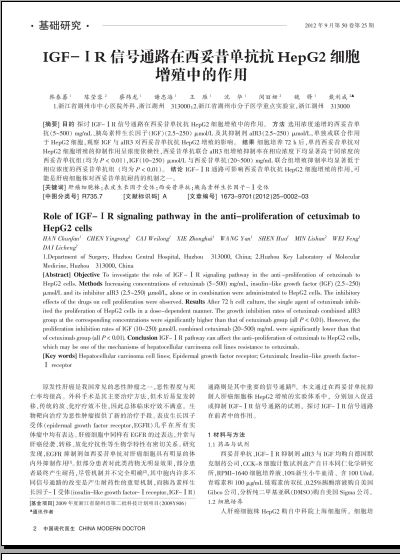IGF—ⅠR信号通路在西妥昔单抗抗HepG2细胞增殖中的作用(1)
 |
| 第1页 |
参见附件。
[摘要] 目的 探讨IGF—ⅠR信号通路在西妥昔单抗抗HepG2细胞增殖中的作用。 方法 选用浓度递增的西妥昔单抗(5~500) mg/mL、胰岛素样生长因子(IGF)(2.5~250) μmol/L及其抑制剂aIR3(2.5~250) μmol/L,单独或联合作用于HepG2细胞,观察IGF与aIR3对西妥昔单抗抗HepG2增殖的影响。 结果 细胞培养72 h后,单药西妥昔单抗对HepG2细胞增殖的抑制作用呈浓度依赖性,西妥昔单抗联合aIR3组增殖抑制率在相应浓度下均显著高于同浓度的西妥昔单抗组(均为P < 0.01),IGF(10~250) μmol/L与西妥昔单抗(20~500) mg/mL联合组增殖抑制率均显著低于相应浓度的西妥昔单抗组(均为P < 0.01)。 结论 IGF—ⅠR通路可影响西妥昔单抗抗HepG2细胞增殖的作用,可能是肝癌细胞株对西妥昔单抗耐药的机制之一。
[关键词] 肝癌细胞株;表皮生长因子受体;西妥昔单抗;胰岛素样生长因子—Ⅰ受体
[中图分类号] R735.7 [文献标识码] A [文章编号] 1673—9701(2012)25—0002—03
Role of IGF—ⅠR signaling pathway in the anti—proliferation of cetuximab to HepG2 cells
HAN Chunfan1 CHEN Yingrong2 CAI Weilong1 XIE Zhonghai1 WANG Yan1 SHEN Hua1 MIN Lishan2 WEI Feng1 DAI Licheng2
1.Department of Surgery, Huzhou Central Hospital, Huzhou 313000, China; 2.Huzhou Key Laboratory of Molecular Medicine, Huzhou 313000, China
[Abstract] Objective To investigate the role of IGF—ⅠR signaling pathway in the anti—proliferation of cetuximab to HepG2 cells. Methods Increasing concentrations of cetuximab (5—500) mg/mL, insulin—like growth factor (IGF) (2.5—250) μmol/L and its inhibitor aIR3 (2.5—250) μmol/L, alone or in combination were administrated to HepG2 cells. The inhibitory effects of the drugs on cell proliferation were observed. Results After 72 h cell culture, the single agent of cetuximab inhibited the proliferation of HepG2 cells in a dose—dependent manner. The growth inhibition rates of cetuximab combined aIR3 group at the corresponding concentrations were significantly higher than that of cetuximab group (all P < 0.01). However, the proliferation inhibition rates of IGF (10—250) μmol/L combined cetuximab (20—500) mg/mL were significantly lower than that of cetuximab group (all P < 0 ......
您现在查看是摘要介绍页,详见PDF附件(3015kb)。